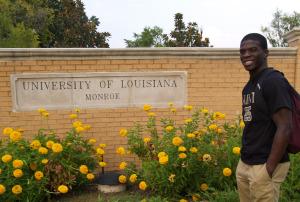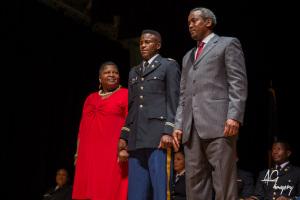
Theo Shaw while still a college student
By Alan Bean
The United States has earned the unenviable title “the incarceration nation.” We lock up six times as many people as countries like Canada and the United Kingdom. And Louisiana owns the highest rate of incarceration in America. Theo Shaw and Robert Bailey, Jr. came close to serving a decade or more in prison; instead, both young men have graduated from college and are readying themselves for even bigger things. On Friday, Theo was the subject of a human interest piece in the NO’s Times Picayune. The next day, Robert Bailey, Jr. graduated from Grambling University and joined the army.
Theo Shaw was at the bottom of his high school class when he was arrested for participating in a high school beat down. But his attorneys believed in him so much that, eventually, Theo started believing in himself. He had to dig himself out of a big academic hole, but he went at the task with grit and determination. He is currently working with the Southern Poverty Law Center in New Orleans and is doing a wonderful job.

Robert Bailey, Jr. with his proud family
Robert Bailey could have been serving time in an isolated Louisiana lock-up; instead, he will be serving his country in the military. He just needed a chance.
That’s why I decided to bring the story of the Jena 6 to national attention. It took some good fortune and the assistance of a broad network of advocacy groups and pro bono attorneys, but we got the job done. In most cases, young men like Theo and Robert have no one to speak for them; no one to believe in them more than they believe in themselves. We can’t save each young person individually; we need to reform the system. That is precisely what Theodore Shaw is doing.
‘Jena Six’ defendant is confident Marshall Coulter can change: Jarvis DeBerry
As notorious black youth go, Marshall Coulter can’t hold a candle to Theodore Shaw. Coulter, described by family as a “professional thief,” hopped a Marigny homeowner’s fence in dead of night last July, and the homeowner shot him in the head. That shooting and two more arrests have made Coulter infamous in New Orleans.
Shaw’s arrest prompted discussion across Louisiana. Indeed, the whole country came to know of the allegations against him. He was one of six black teenagers from Jena whose alleged participation in a 2006 schoolyard attack on a white schoolmate prompted a prosecutor to go after him for aggravated battery and attempted murder.
After smaller eruptions of racial unrest at the school LaSalle Parish District Attorney J. Reed Walters had warned students that he could change the course of their lives “with the stroke of a pen.” Shaw thinks it was that disregard for his life and potential – and for the other defendants’ lives and potential – that led the DA to file those outrageous charges.
And Shaw didn’t appear to be going anywhere. “I really didn’t take education that seriously,” Shaw said in a Garden District coffee shop Friday morning. He thinks he was ranked dead last in his senior class. Graduation was approaching, and he had no plans beyond that. It wouldn’t matter. The same day a white student was beat up on campus, Shaw got called to the principal’s office. He was read his Miranda rights and led away in handcuffs. He says he hadn’t fought anybody. Even so, he spent seven months in jail. If not for national outrage, he might be in prison today.
Shaw was eager to talk about Coulter not because he believes the teenager is innocent. What he believes is that Coulter has the potential to do better. Shaw, now 25, counsels juvenile offenders in Harrison County, Miss., as part of his job with the Southern Poverty Law Center. He tells them “they have some … power in creating the person that they want to be.”
But it’s unlikely, he said, that the young and aimless will try to transform themselves without being prompted by caring adults. Robert McDuff and Derwyn Bunton, Shaw’s attorneys, later helped him apply to college. It took him a while to share the confidence they had in him. He asked himself, “What do they see in me that I don’t see in myself?”
Shaw, who when he was arrested had no plans past high school, graduated in 2012 from the University of Louisiana at Monroe with a B.A. in political science. He is planning to apply for law school this fall.
He had an important work meeting Friday morning; else, he’d have been in North Louisiana watching his friend, Robert Bailey, become the second of the Jena 6 to graduate from Grambling State. One co-defendant is at Southern University, he said, and another is at Hofstra University in Long Island, New York. The last of the six, Shaw said, is working at a Louisiana oil field.
If the prosecutor had triumphed and those young men had been sent away for decades, imagine what our society would have lost. Imagine all the intelligence, talent and labor Louisiana is already losing as it leads the world in locking people up.
It’s tragic enough that we’ve mostly abandoned the idea of adult rehabilitation. It’s even worse that so many people have declared teenagers lost causes, past a point where they can be saved, past a point where they can turn their lives around and do something positive. “It’s so hard to say kids are not capable of reform,” Shaw said.
He got a sense of his own potential for doing something right when he was in jail and started filing his own motions for a bail reduction. “I’d file a motion and then (the court) would respond,” he said. “I was like, ‘Whoa!’ That felt empowering.” When a judge did lower his bail, it was still too high for Shaw’s father to pay, but it wasn’t lost on him that he had written something that demanded a judge’s attention.
After the national protests and after the charges were reduced, Shaw and four others eventually pleaded no contest to simple battery, a misdemeanor. The sixth pleaded guilty to second-degree battery as a juvenile.
It’s his own experience with being nearly discarded, his own maturity from driftless teenager to disciplined adult that informs his work with young people society has decided can’t be helped.
He’s seen plenty of young people like Marshall Coulter, he said. “When I advocate for them, I’m advocating for myself.”
